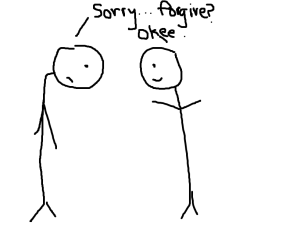 Ever have one of those days?
Ever have one of those days?
Tired. . .
Busy. . .
Frustrated. . .
Off kilter. . .
Ever let that tired, busy and frustrated Self take it out on your child?
Well I have. Too many times to count, I’m afraid. It may just be an, “I don’t have time to listen right now!” in a curt tone. Or, “I can’t watch you play one more  video game! I’ve got to get some work done!” in an exasperated sigh.
Or. . . not doing something I said I would do.
Or. . . being distracted, when my child really wants to share something with me.
What ever the case, I’ve learned that when I have one of these days, where everything my child wants me to look at, play or do with him seems like an insurmountable chore, it’s time to stop and follow these simple steps.
Â
Step 1: Â Take Care of Myself
Probably didn’t see this one coming in as number one on How to Apologize. But for me, when I can get myself calm and have compassion for myself for feeling overwhelmed or being tired, I can remember what’s important. My relationship with my child. If I try to apologize when I’m grumpy the apology seems inauthentic or forced. There’s little space for true connection. Allowing a little empathy for myself goes a long way towards making a genuine apology and my kids know the difference.
Step 2: Forgive Myself
Parenting and partnering with my children is such an important job! I want to do it right. I want to be present with them Every Single Moment. I want to see them happy and free and confident.  But some days, I’m just not feeling it. I am human after all. One of the biggest things I can do for my kids is to forgive myself when I make a mistake.  If I operate out of guilt or from a place of not being “good enough” my kids feel it. I’m back to being inauthentic and trying to gain their approval rather than just being with them for the joy and pleasure that it really is. Guilt damages the relationship, perhaps more than our orginal transgression, because it sends the signal that we’re not really worthy of being forgiven. Our kids feel responsible somehow for our underlying unhappiness, perhaps unconsciously.  When we forgive ourselves, we provide a clean slate to begin again. And our kids learn that  we are all worthy of forgiveness and deserve to start over.
Step 3: Â Take Ownership
Apologize. Explain to my child that my acting out had NOTHING to do with HIM. It was all about me. I was tired or my mind was busy. My kids are 27, 13 and 11. When they were younger it seemed all I had to do was give tickles and hugs and all was forgiven. But now that they’ve gotten older, they are much more likely to internalize my words and actions  – the good and the not so good. When I’m grumpy and respond to them from my tired or overwhelmed place, I see them shrivel just a bit.  When I can communicate to them that my actions were not a response to their being bad or wrong or “too much” but rather from MY feeling out synch, it opens a door way for mutual compassion and helps them to see that we all have bad days and sometimes respond in less than loving ways.
Step 4: Â Listen
Listening to my kids has been one of the best forms of apology that I can give. Sometimes my apology is not received right away. Sometimes one of my kids needs to vent about ALL the times that I didn’t live up to their expectations. This can be difficult. I mean, here I am, trying to apologize and wanting to be forgiven and I get whacked with even more of my less than perfect parenting skills. But listening provides a portal into the unseen world of my child. When I listen without being defensive or feeling guilty, I learn a whole lot about how my child sees the world. When he says, “You are always busy and never listen and never want to play with me.” I can really take that in. This is how he’s feeling, right here and right now. Rather than try and prove how RIGHT I am, reminding him of all of the times that I DID play and listen and was present, I can see from his perspective. I can validate his feelings and talk about how I might improve. This models for my child effective ways to handle conflict. It helps him to feel heard and honored and eliminates the need to internalize his feelings.
Step 5: Do Something Fun
After we talk, I always try to do something fun with them. Play a board game, a video game or go for a bike ride. This seems to dissipate some of the “drama” that has unfolded. Having fun together and replacing a good action with a not so good one, always brings laughter and silliness back into our day. It lightens the load and brings us back to what is most important. Our relationship with each other.
Â
Mistakes happen. Even the most present and authentic parents have their days. But our mistakes can always turn into discoveries about ourselves and about our children. I have discovered a lot about my kids by making mistakes. They’ve learned a lot about me. Good parenting is not about never making mistakes but about being conscious of them, communicating effectively and  moving through to the other side – The joy of spending my days with the most awesome people in the world. . .my kids.